Staff Inquiry: Most Affecting Deaths
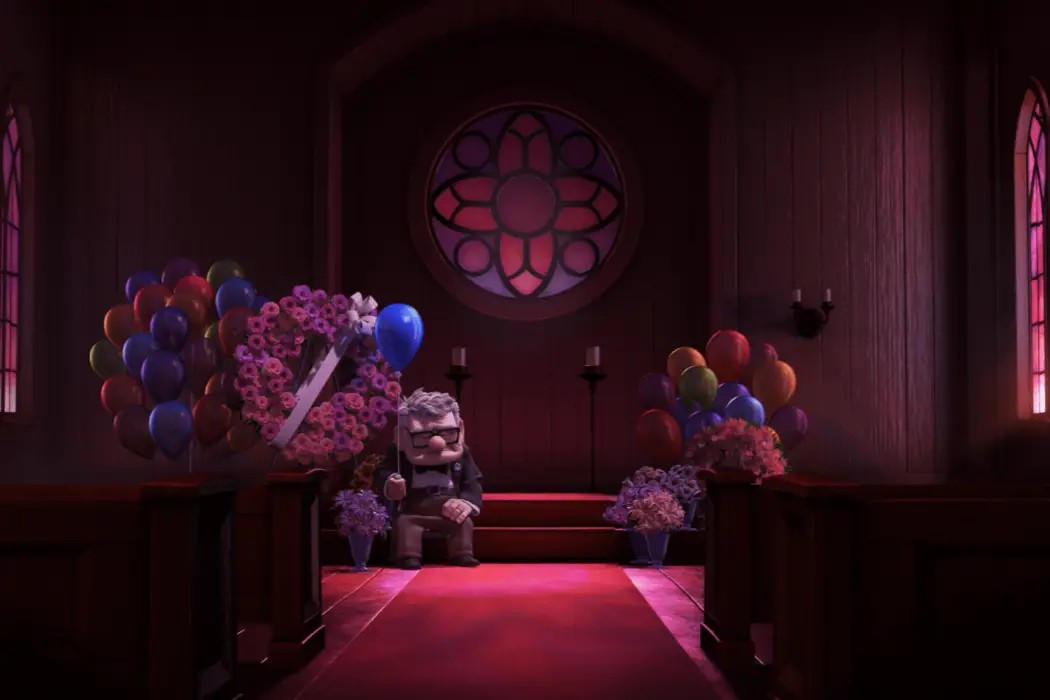
Alex is a film addict, TV aficionado, and book lover.…
All good things must come to an end, but sometimes our favorite movies and TV shows take characters from us way too early. As people who jump into stories with open hearts, these can cut pretty deep, and the scars they leave behind stay with us forever.
There are innumerable examples of on-screen deaths that rocked our world, and this month our writers are picking out the ones that hit them the hardest. Some sobbed, others went into shock, but each and every one of these characters went out in a way we’ll never forget.
Zoe Crombie – Ricky, Boyz n the Hood (1991)
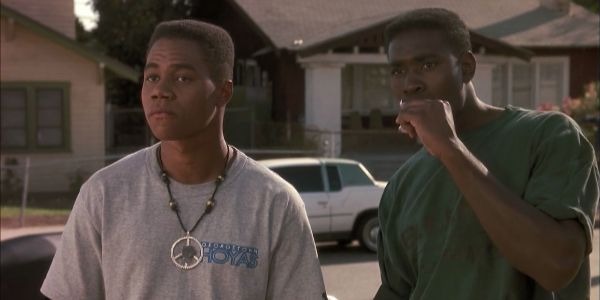
I never used to cry at films. As a kid, I distinctly remember regularly hearing a sniff coming from next to me if someone died or fell in love onscreen, and turning around to confirm that my mum was, in fact, having a little weep – this usually resulted in some light teasing from me, along with genuine confusion as to why she was so easily affected. This all changed when I was around 12 and was watching the late, great John Singleton’s masterpiece Boyz n the Hood for the first time.
Of course, the death itself was terrible, but it wasn’t what truly got to me. I had watched characters die in films plenty of times, in ways that were almost certainly too violent for me to be seeing at that age. So as the gentle, optimistic Ricky was gunned down from behind in slow motion, my initial reaction was closer to shock than genuine misery. This was until Cuba Gooding Jr.’s Tre brings his body back home to his unsuspecting family.
Everyone reacts differently to grief, and the full gamut of responses are brutally shown here, exhaustively portrayed through powerhouse performances from Tyra Ferrell and Alysia Rogers as Ricky’s mother and girlfriend respectively. While the latter immediately breaks out into a screaming fit, distraught at the sight of his blood-covered body and unable to quell their shrieking infant son, the former is in utter disbelief, desperately searching for an answer to the unexplainable murder of her favourite son by shifting the blame to her other child.
As well as effectively demonstrating the catastrophic violence indirectly caused by institutional racism, Ricky’s death is one of the most heart-wrenching in cinematic history, agonisingly drawn out to highlight the full breadth and depth of its impact on the remainder of the plot and the characters.
Bree Duwyn – Tommy, The Shawshank Redemption (1994)
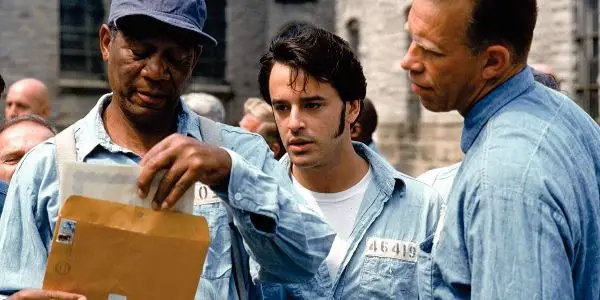
Deaths in film and television are used to evoke raw reactions from audiences that leave an everlasting impression on a viewer. At times, these deaths are so beyond effective that we are left with their lingering characters far after the film ends.
One of the most devastating deaths in a film that I have witnessed is the death of Tommy Williams (Gil Bellows) in The Shawshank Redemption. Not only was Tommy young with a wife and baby girl, he was also desperately attempting to turn his life around by getting his high school diploma. With the help of Andy Dufresne (Tim Robbins), Tommy passed with a C+ average and had high hopes for his future.
Continuously curious with how Andy ends up in jail, Tommy discovers the real reason behind the imprisonment of his mentor. Once it is discovered that Tommy previously shared a cell with the true killer who committed the murders of Andy’s adulterous wife and her lover, Andy unravels and is determined to use Tommy’s story to finally find freedom. However, Tommy would never get the chance to tell his truth after Warden Norton orders Hadley, a prison guard, to shoot Tommy on the pretense that he was attempting to escape the prison.
As Tommy’s lifeless body is sprawled out on the pavement, the scene is a tough pill to swallow as his death not only means that Andy will never redeem his innocence, but the life of a young man with a family and intentions to turn his life around, was taken because of Norton’s greed for control and money.
Tommy’s death was heinous and presented a turning point in the film; Andy decided he couldn’t handle prison anymore and the passing of Tommy brought him to the harsh realization. Despite Tommy’s loyalty to
Andy, his death was predictable with the truth he knew, therefore dangerous to Warden Norton, who decided to silence Tommy.
Maria Lattila – Joyce, Buffy the Vampire Slayer (1997-2003)
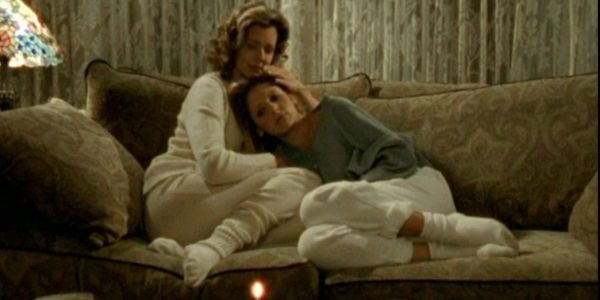
Buffy the Vampire Slayer is a show about a vampire slayer who battles both demons and your usual coming-of-age problems on a daily basis. The world seems to constantly be ending and poor Buffy must save it every time. She always does save the world, sometimes at a great personal cost, but always coming out on the other side.
The world has never come so close to ending as in “The Body.” In season 5, Joyce battles a brain tumor and Buffy must face reality, where tragedy isn’t rooted in the supernatural but the very mundane and unavoidable. Joyce has surgery and survives her tumor, and all is well again in Buffyverse. Until Buffy returns home one day and finds her mother on the sofa, unnaturally still. Dead. Her body is limp, heavy, and Buffy even breaks it when attempting to perform CPR, the loud crack of Joyce’s bones breaking piercing the still air.
“The Body” is an unusual episode in a series full of unusual, groundbreaking episodes. “The Body” is an audio-visual work of art, which is why the whole episode is so affecting. Drawing from his own experiences after losing his mother, Joss Whedon presents Joyce’s death in all its brutality. With very little music, excruciatingly long takes and a sickeningly yellow-orange hue to the episode, “The Body” draws both an emotional reaction from you by being the most brutal, violent, upsetting version of itself it can possibly be.
Buffy is used to being able to fix things through magic, restoring some sort of order, but this is the one thing she can’t and shouldn’t fix. Joyce’s death, caused by a brain aneurysm, is too normal to be true. How can the least violent death feel the most violent in a series that focuses on fighting demons, both internal and external?
George Nash – Randy, Scream 2 (1997)
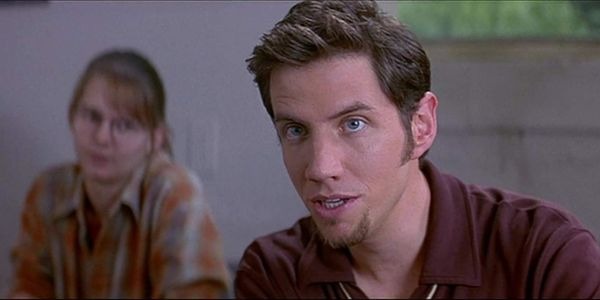
Were my life to ever depend on it — you know, one of those classic late-night-round-your-mates-after-a-few-beers hypotheticals that places you in an abandoned warehouse somewhere staring down the barrel of a gun — my answer to the question of the most affecting death in all of movie and television would go something to the tune of John Coffey, The Wire’s Wallace — a baby-faced Michael B. Jordan meeting his maker in perhaps the cruelest way imaginable — or pretty much any name pulled from the ever-increasing tombola of Disney/Pixar parents.
Thankfully, I am yet to find myself in such a predicament and movies/TV are entirely, and wonderfully, subjective. This means that, in fact, the most devastating death in the history of film is one that the uninformed might simply dismiss as little more than another snot-nosed, brain-dead teenager getting offed by a mask-wearing, knife-wielding maniac.
Randy Meeks, the resident (and slightly neurotic) movie-obsessed adolescent of the Scream franchise, is no such thing, however. A cine-literate, virginal eccentric who is equal parts goofy, smart and adorable — rather surprising given that the actor who plays him, Jamie Kennedy, has been distinctly rotten in pretty much everything he’s done since — Randy exists as the crucial mediator between viewer and (prospective) victim, giving Wes Craven’s genre restarter its self-reflexive batteries as he lays down the golden rules for surviving a scary movie.
After evading death in the first film, Randy is less successful in the sequel, however, betraying his own rules and getting dragged into a parked van and butchered in broad daylight part way through an on-brand rant to the killer over the phone. It’s a necessary death, of course — if Randy (AKA the audience) can die, no one is safe — but, with a love for kickass final girl Sidney Prescott (Neve Campbell) that goes unrequited and a legacy of quirky, quotable dialogue, it’s one that really hits us where it hurts.
Craven, who reportedly received death threats from enraged Meeks fanatics after the film’s release, did offer appeasement in the third instalment: a shoehorned Randy cameo via posthumous videotape warning those left alive of the perils of the horror trilogy. But, for many, the damage had already been done.
The ever-reliable ‘Scream Wiki’ page states with authority that of all the deaths in the series, Randy’s had the biggest impact on Sidney, a protagonist who sees her best friend(s), boyfriend, mother, and aunt — who shows up in the fourth film despite never being mentioned previously — all fall victim to Ghostface’s blade. I can only agree. Wholeheartedly.
Lewis Punton – Littlefoot’s Mother, The Land Before Time (1988)
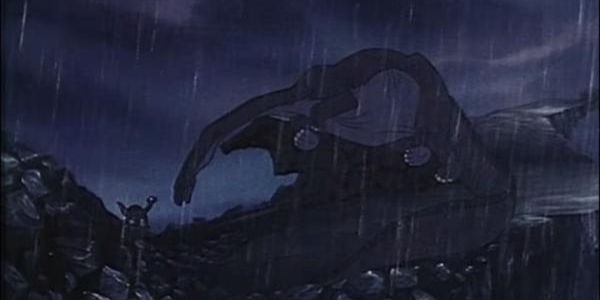
There comes a point for the teachings of morality and motherhood to become vital, and nothing teaches you about maternal instinct quite like the death of a 60-foot Apatosaurus, so thanks for that, The Land Before Time.
The lessons we learn throughout our childhood go on to define us, shape the way we think, and dictate the energy we give back to the world in later stages of life, meaning that they can’t be underestimated in the slightest, and this feature-length masterclass knows that.
The Land Before Time instantly establishes its moral compass, using the passing of Littlefoot’s mother to set the tone of the prehistoric animation whilst simultaneously driving an emotional pitchfork through the viewer’s naivety.
As the death of this elderly dinosaur serves as a tonal marker, establishing the reality of the story at hand, the loss of maternal driving force helps to shape the remaining protagonists, forcing their journey through a lens of realism familiar with members of the audience.
On a slightly more technical note, the animation on display throughout this feature-length Jurassic telling is otherworldly, grounded, and imagination-shaping, defining the minds of a generation whilst it dances through its run time.
The story of The Land Before Time is well, timeless, using the heart-wrenching death of a maternal figure to pivot on a heel of realism in its opening act. Whilst the plucky heroes go on to define their pathways, the lack of an elderly role model dictates the decisions they make throughout, leaving the film a relatable, if not heartbreaking, adventure.
Linsey Satterthwaite – Ellie, Up (2009)
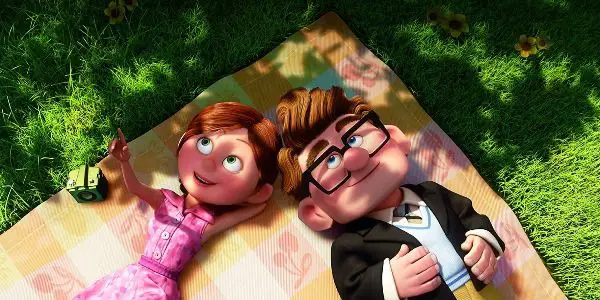
Everyone knows Pixar’s ability to produce moments of joy and wonder one minute and scenes of utter heartbreak the next, but even by their emotional string’s standards, they managed to sucker punch an astonishing montage that leads to one of cinema’s most affecting deaths.
Up begins with the friendship that forms between two children Carl and Ellie, their bond created by their love of adventure. What then follows is a medley of scenes as Carl and Ellie grow up, get married and grow old together, set to Michael Giacchino’s playful and jaunty score.
But as the music remains the same but simply and masterfully changes key, we begin to realise that tragedy is about to unfold. As Ellie begins to slow down walking up a hill that she once raced up with Carl, a sense of melancholy pierces the bubble, like one of Carl’s balloons slowly deflating. As the scenes change from Ellie on her deathbed to Carl mourning at her funeral, Pixar has turned smiles in the cinema to a collective sobbing in the crowd.
Up’s opening moments manage to crystalise a lifelong relationship in a handful of perfectly judged and heartrending images, so whilst it plays out in 2D, it is rooted firmly in reality. And that’s what makes Ellie’s death so afflicting as it strikes a chord for anyone who has ever loved and lost, whether it was a friend, a partner or a family member.
For me personally watching this so close after losing my Nan was almost unbearable. If Ellie’s on-screen passing teaches us anything (apart from always having a handful of tissue at arms reach for a Pixar film) it is that if we have found the Ellie to our Carl, in whatever form that may be, we need to cherish every goddamn moment with them and make sure we seize every goddamn adventure together.
Kristy Strouse – Hank, Breaking Bad (2008-2013)
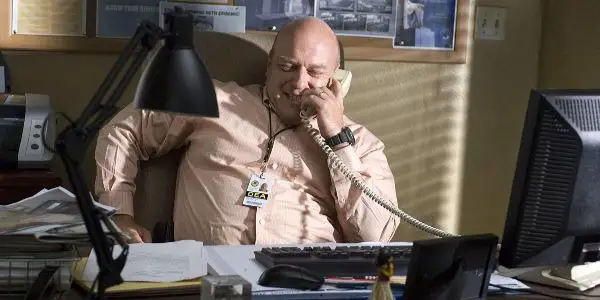
It may seem like a curious choice when I’m talking about one of my favorite shows of all time (Breaking Bad) to go with the death of Hank (Dean Norris) over Walter White’s (Bryan Cranston) demise. The finale of Breaking Bad, in my opinion, is perfect, including his end. It’s also spliced with Jesse’s (Aaron Paul) escape, and the conclusion is one that makes sense given the circumstances. So, while I’m saddened to see the chemistry teacher turned drug kingpin perish, I’m also happy with the way it ends. We’re looking for devastation in this month’s team collaboration, and when Hank dies, it’s a real punch to the stomach, jaw-dropping moment.
This whole sequence (and the episode) is one of the show’s best, and when Hank shows up, right before some very dangerous cohorts do, there’s a tension and fear that seeps into your bones. At this point, Walter White had done a lot of horrible things, and stood his ground, gaining confidence (let’s call it arrogance) when dealing with difficult and life-threatening situations.
But, this is when his criminal life really begins to bleed into his home life. No matter what’s happened between these two he deeply cares for his brother-in-law Hank. He pleads for him to live, and there’s a rawness and helplessness to Cranston’s performance that makes you suffer alongside him. When Hank says, “You’re the smartest guy I’ve ever met, and you’re too stupid to see he made up his mind 10 minutes ago” regarding his fate, it’s heartbreaking.
This signals a shift within Walt’s life where his wrongdoings come to a head and he’s no longer able to separate the damage he’s inflicted from his family. Hank’s reaction, steadfast in his honorable ways, makes the loss even more potent, as he doesn’t insist on pleading for his life. It’s television at its finest, and a TV death at its most devastating and consequential.
Emily Wheeler – Dee, Battlestar Galactica (2004-2009)
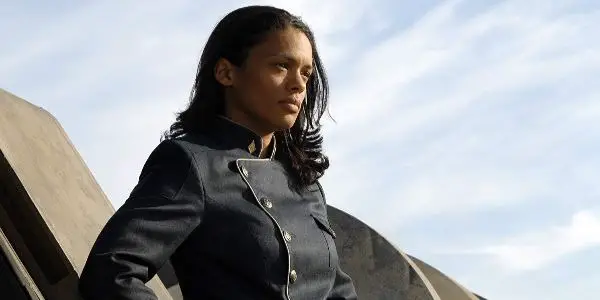
I adore movies, but it’s television that really gets me attached to characters. It’s the sheer amount of time you spend with them, the hours and hours that you see them challenged and defined that makes me feel like they’re people I know instead of just characters. Usually, I can predict their reactions, and the fact that I never saw the suicide of Anastasia “Dee” Dualla (Kandyse McClure) coming is what made it so traumatizing.
Sure, it occurred after the long-suffering crew of the Galactica discovered their prophesied home was a radioactive wasteland, but this was a series about putting characters through the wringer. It was a sci-fi metaphor for our post-9/11 world, complete with terrorist attacks, religious extremism, and torture. There was a literal running tally of the number of humans left alive, so death was hardly an unusual occurrence in the show.
But Dee had been there from the beginning, a bastion among the chaos that surrounded her. She had been hurt, she had wavered, but she always appeared back on deck to do her job and get on with life. If the show’s world had become too much for her to handle, you knew it had moved to a whole new level.
I had taken the revelation that their prophesies were incorrect in stride. I went into shock when Dee pulled the trigger. My brain went foggy, my emotions disconnected, and my chest tightened. I’ve never had that reaction to an on-screen death before or since, and my only comfort at losing such a beloved character is that it accomplished the exact narrative purpose it was there for.
Tynan Yanaga – Dobby, Harry Potter and the Deathly Hallows: Part 1 (2010)
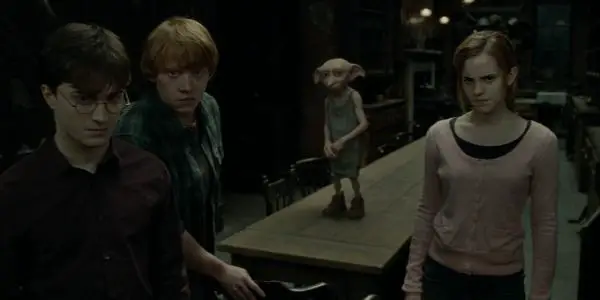
Rarely in an epic adventure is the main protagonist my favorite – not that I don’t like them, but they already have all the focus. Instead, I find myself gravitating toward the supporting cast. In fact, if I were to be in a film I probably would be in the periphery working behind the scenes to empower the lead in some invisible way. While you garner none of the glory, you gain the self-satisfaction.
My own penchants aside, it’s deaths like Dobby’s at the start of The Deathly Hallows that somehow affect me the most. Certainly, he’s not a central character, but one could make the case he’s just as important because he gives us reason to connect with Harry Potter, to stand by him, and feel like he’s worth rallying around.
Is it an effective play for our emotions? Most definitely, but the bottom line is that it means something. There is weight. There is cost. It’s not cheap to save the world and wage war against the powers of darkness. Sacrifice is necessitated even to the point of death. To paraphrase a famous verse:
There is no greater love than this, a house elf laying down his life for a friend. Dobby is the ultimate faithful companion and to my mind, he’s king of the house elves, a continual champion for Harry against the naysayers. Like Sirius and everyone else who gave their lives, he knew what sacrifice was and counted the cost.
And it tears out my heart every time because it reminds me of a callous reality: death shows no partiality. It is unfair and uncalled for. But it also separates the wheat from the chaff. Dobby is without a doubt among the former. The wizarding world did not deserve him. May he rest in peace.
Those are just a few of the deaths that devastated us. What are some of yours?
Does content like this matter to you?
Become a Member and support film journalism. Unlock access to all of Film Inquiry`s great articles. Join a community of like-minded readers who are passionate about cinema - get access to our private members Network, give back to independent filmmakers, and more.
Alex is a film addict, TV aficionado, and book lover. He's perfecting his cat dad energy.













